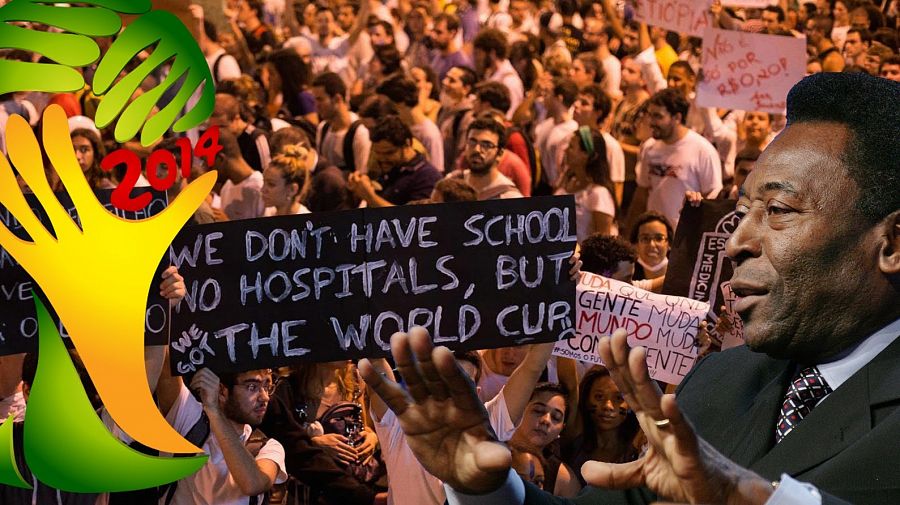The other side of the Brazilian World Cup

Behind the glitz and glamour of the Brazilian World Cup lies a seedy underbelly of corruption, waste and inequality, writes Alexander Swift.
THIS YEAR’S FIFA World Cup has brought to light many things.
With it, of course, the glitz and glamour of the world’s most popular
sport on a global scale, which will undeniably decide the next popular
haircut.
For some, the world has stopped for three weeks. The regimentation of
everyday normality discarded for the incomparable festival of the aptly
titled joga bonita.
Pundits, punters and patriots emerge from the depths of obscurity as
overvalued idols of the masses take centre stage for 90 minutes at a
time.
Amidst the chaos on the pitch, many have turned their eyes to the
abhorrent scenes in Brazil’s underbelly. To many, this would be inherent
knowledge, whilst others seem blissfully unaware that South America’s
richest country has a gap between rich and poor that is as vast as the Amazon’s breadth.
Anyone who has travelled to, read about, or even seen pictures of
Brazil would be unambiguously aware that years of corruption, foreign
domination and natural disasters have left Brazil and its poorer
population in desperate poverty.
The 2002 feature film Ciudade de Deus (City of God)
is a tumultuous example of the relocation of masses to form ghettos
who, left to their own devices, with no system of government, no welfare
or health, no rules or legislation, become what most westerners would
consider the inner reaches of Hell on Earth.
But again, this is nothing new.
FIFA’s resounding corruption
further fuels a fire lit many years ago. In a way not to dissimilar to
the law the applies to the inhabitants of the City of God, FIFA has strangled the Brazilian government, using its power and privilege over the rubber arm of a desperate ‘democracy’.
But again, this is nothing new.
Of course, a romantic notion of The World Cup would be that the majority of the billions of dollars made in Brazil will return to the government, and systematically into the community.
However, this will not be the case.
Much of the money raised will go straight into the crevasse-like pockets of FIFA (approximately $4 billion), whilst revenue generated by the Brazilian government is still entirely speculative.
Vinicus Lages, Brazil’s tourism minister, has predicted an increase of $13.5
billion as a result of frivolous penny droppers and thirsty supporters,
offsetting the $11bn costs of what is now the most expensive World Cup
ever. (The income generated by local pick pockets, who by all accounts
are doing a roaring trade, has not been estimated.)
With major sponsors to reap huge benefits, and not to mention the
building contractors who have supplied stadiums containing 50,000+
capacity, for cities without major football teams, the money will again be parried away from the hands of those who need it most.
But again, this is nothing new.
What will the future bring for Brazil?
Of course, before the event, there were campaigns to boycott the
World Cup. People taking notice of the poverty and corruption that
exists in one of the world’s most popular countries and not to mention
the farcical arrangement that governs our beloved ‘beautiful game’.
Three weeks later, this has been forgotten — like Haiti, like Rwanda, like the Nigerian schoolgirls, even like MH370.
Those ‘passionate’ advocates of a better world will find another trendy
cause and propose more armchair ideals that will become ever-so popular
on social media.
But again, this is nothing new.
The risk of hypocrisy is riddled throughout this article, so in turn I must propose a solution.
If the individual wishes to make a difference – just a slight
difference, akin to turning off a light-bulb to slow down the once
popular ‘global warming’ phenomenon – go to the country.
Take some money. Spend it at non-global, non-conglomerate,
non-franchised outlets. Eat the food, buy the crappy shirts, wear the
fake sunglasses, become truly immersed in the culture.
At the risk of staining your underpants or spiriting away a few of
your hard-earned dollars, support those who have nothing. Simply by
staying in a hostel, where locals are employed, you are making a
difference. Employment leads to opportunity, opportunity leads to
education, education leads to life beyond the status quo.
But again, this is nothing new.

This work is licensed under a Creative Commons Attribution-NonCommercial-NoDerivs 3.0 Australia License

No comments:
Post a Comment